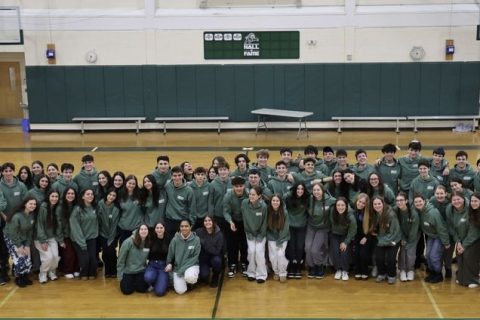In the few months beginning and ending the school year, when the Friday school day ends at 2:30 p.m. rather than 1:30 p.m., a speaker is invited to fill that extra hour every Friday by delivering a meaningful speech on a topic meant to resonate with the students. The majority of the speakers share a piece related to Schechter Westchester’s six core values: love of Israel, social action, respect, community, lifelong learning and study, and observance. Yet, despite their intended connection to the school’s central values, several students and teachers have raised concerns of the speakers’ display of their personal, political views.
Many of the speakers come to Schechter seeking to share a personal anecdote about which they are fervent; some wish to motivate and inspire their young audience with an engaging and relatable story.
Rabbi Joshua Cahan, the faculty member in charge of organizing the programs, said: “I look for speakers who will get students to think differently, and in a more complex fashion about a situation or problem, and to be more reflective about their own choices.”
According to Cahan, students do not always have the necessary background about the topic, and reinforcing the students’ understanding could be done through a subsequent discussion of the special program; doing so would allow for a more complete and substantial understanding of a speaker’s message. However, in giving these messages, there is sometimes criticism of a speaker’s political ideologies.
Last year, Rabbi Jill Jacobs, Executive Director of T’ruah: The Rabbinic Call for Human Rights, delivered a speech about her pursuit of abolishing anti-Islam sentiment. Her presentation prompted opposition from several Schechter students, some of whom left the program in the middle.
“I thought [the T’ruah special program] was completely inappropriate,” senior Justin Sofer said. “They basically target anything that has to do with Israel. You go on their website, and you don’t see anything on Saudi Arabia; You don’t see anything else on human rights except for in Israel, which, if you’re a human rights organization, is completely hypocritical.”
Sofer also said he believes that bringing in any speaker– on the right or the left on the political spectrum– is inappropriate and not in line with Schechter’s values: “The school should not bring in speakers that would deliver [political] opinions because it gives the appearance that the school sanctions those opinions. Political special programs would be great if they were held in a different format. The current format is somebody just pushing their agenda to an audience of high school kids, rather than having educated discussion or debate on the issue.”
History teacher Michael Newman said that it is up to the students to decide their own views and to question the speakers. The purpose of the programs, in his view, is to expose the students to relevant issues, coming from speakers with experience and expertise on their topics.
“Many speakers come in to talk about relevant topics about overcoming challenges which help the students walk away with a valuable lesson,” Newman said. When asked about the political leanings in the presentations, he said, “It’s about presenting the experience of an individual.”
According to Hebrew teacher Avi Nahumi, the purpose of the special programs is, “to give a different level of understanding to younger people and to teach them how to handle situations in their adulthood or with their friends.”
Nahumi said, however, that he does think the special programs may favor one political side: “With the connections of some people in the school, it [is] easier to get that side to come in and speak to the students,” Nahumi said.
But Nahumi disagrees with this approach: “The special programs should not involve politics, and they should deliver a message where the students can decide which side they stand on for the topic,” he said.
Several students also claim to notice this political slant.
“While the speakers at Schechter do try to teach us about social justice and issues in the world, they always push in a left wing political agenda,” sophomore Sam Louman said. Though he said he does not think that this is done intentionally, “If the program is going to have a political agenda, [the agenda] should be either diverse, or neutral,” Louman said.
“It’s not the school’s responsibility to teach politics. It should be up to the students,” he said.
Other students, however, do not notice any blatant political leanings of the speakers and believe the program’s purpose is beneficial to the student body.
“It’s good for the students to be challenged on their views by guest speakers,” junior Jacob Fortinsky said. “I don’t believe the speakers have political agendas although Schechter typically tries to promote Jewish values through the speakers whom they select, and those values just happen to reflect liberal views, generating more liberal speakers.”
But Fortinsky does not claim that this is a problem that needs fixing: “It is important for any institution, especially a school, to promote their beliefs […] Schechter has a set belief, and, as a private school, doesn’t have to remain neutral. When people enroll for Schechter they are registering for their beliefs.”




